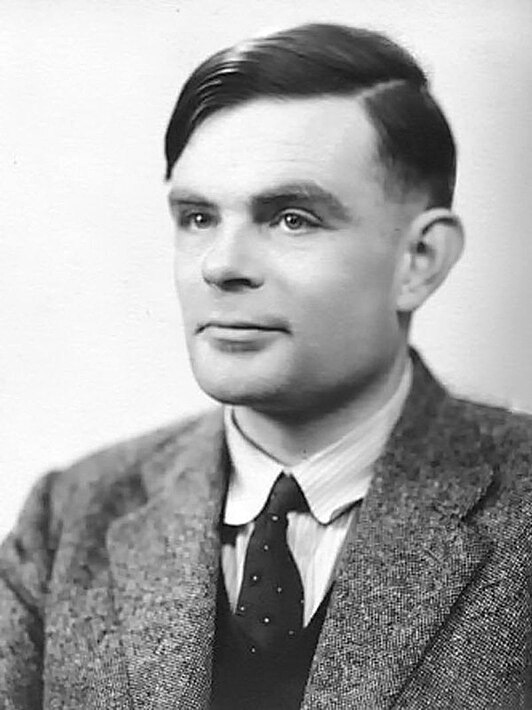Alan Turing, de bekende wiskundige uit het Verenigd Koninkrijk, stond aan de wieg van de moderne computerwetenschap. Lang voor het ontstaan van ChatGPT en het internet of ook maar iets wat leek op de moderne computer werkte hij al aan het doordenken van het basisprincipe van een computer: een machine die eindeloze reeksen instructies opvolgt. Binnen de informaticatheorie wordt een computer - klein of groot, simpel of heel krachtig - dan ook als een Turingmachine omschreven.
De test is vrij eenvoudig: iemand vraagt iets aan zowel een mens als aan een computer, en krijgt twee antwoorden terug zonder te weten wie of wat dat antwoord heeft gegeven. Als de vragensteller na een bepaalde tijd en hoeveelheid vragen niet kan vertellen welke antwoorden door de computer waren gegeven, is deze computer als het ware "geslaagd" voor de Turingtest. Kortom, hoe goed kan een computer een mens nadoen?
Met de huidige modellen zoals ChatGPT is het wel duidelijk dat het "nadoen" van menselijk gedrag bepaald niet energievriendelijk gebeurt. Het is een ingewikkeld en kostbaar proces, misschien juist wel omdat een computer geen "ziel" bezit, niets "aanvoelt".
De Turingtest van het leven
Alan Turing ontwierp zijn test voor machines. Maar het "nadoen" van menselijk gedrag is niet alleen beperkt tot computers, ook mensen zélf doen dit voortdurend. Het is zelfs de vraag of er überhaupt communicatie plaats vindt zonder dat mensen zich bewust of onbewust een bepaalde rol aanmeten met bijpassend gedrag. Het puur "jezelf zijn" wordt veel aangeprezen maar in de praktijk toch slecht gewaardeerd.
Bij de verhoudingen tussen mensen kan dan de vraag worden gesteld: als de ander aardig overkomt, is die persoon dan ook aardig? Wat is het verschil tussen aardig doen en aardig zijn als het verschil nooit wordt gemerkt? Als er een verschil is, dan is dat vooral een mogelijk probleem voor de persoon die zich anders voordoet dan hij of zij is. Die kan een oplopende druk ervaren om vriendelijkheid uit te stralen. De "ontvangende" partij weet van deze druk niets, en die kan juist heel blij zijn met de vriendelijkheid die de "zendende" partij uitstraalt, wat mogelijk de druk nog verder opvoert. In zo'n geval is het helpend als er in ieder geval een paar mensen zijn die je wél goed kennen en waarbij je je vriendelijkheid even kan laten voor wat het is.
Deze problematiek is nog wat concreter voor mensen met autisme, en dan heb ik hier vooral de hoog-functionerende variant op het oog. Het nadoen van gedrag is iets waar je een dagtaak aan kan hebben.
Autisme en de Turingtest
Van jongs af aan leren meisjes om zich aan te passen, aan verwachtingen te voldoen. (...) Zo leren vrouwen met autisme sociaal gedrag in feite aan, in plaats van dat ze het aanvoelen. Ze maken gebruik van patroonherkenning in de omgang met anderen, en kunnen heel goed sociaal wenselijk gedrag vertonen.
Dat aspect van "patroonherkenning" dat Annelies noemt, zou rechtstreeks uit de informatica kunnen komen; en het is iets waarvoor juist ook kunstmatige intelligentie wordt ingezet. Kunstmatige intelligentie dat zonder enige mate van gevoel zó kan worden getraind dat het minstens net zo goed als een mens patronen kan herkennen.
De vraag die ik hierboven al stelde rond het gewone menselijke communicatieverkeer kan ik toespitsen op mensen met autisme: als iemand met autisme zich zó kan aanpassen dat de omgeving niet merkt dat er van autisme sprake is - doet het er dan nog wel toe? Voor de omgeving is dat maar zeer de vraag, hebben we gezien.
Maar daar ligt dan ook gelijk het grootste probleem. Want wat de omgeving niet ziet, is de hoeveelheid energie die het schijnbaar eenvoudige sociale verkeer kost voor de persoon met autisme. De omgeving staat daar dan ook niet bij stil. Dit doet op een bepaalde manier denken aan de manier waarop een chatbot vandaag de dag wordt gebruikt. Sam Altman, de baas van OpenAI dat ChatGPT ontwikkelt, maakte onlangs duidelijk dat het bedanken van de chatbot veel energie kost (de chatbot zal er namelijk weer op reageren). Er is vervolgens discussie ontstaan over de vraag of het bedanken wel of niet de kosten van al die energie waard is.
Op dezelfde manier kan de omgeving van iemand met autisme onwetend en uit gewoonte iets vragen dat veel (verborgen) energie kost. Annelies Spek gaf dat ook als antwoord op de vraag of het juist niet belangrijk is om jongens met autisme te stimuleren zich net zo aan te passen als meisjes vaak doen. Ze zegt in hetzelfde artikel:
De vraag is in hoeverre ze ermee geholpen zijn, want vrouwen lijken over het algemeen meer te lijden onder hun autisme dan mannen. Ze leggen de lat hoger voor zichzelf, willen niet afwijken van hun omgeving. Ze functioneren goed, maar door dat voortdurende compenseren hebben ze vaak wel een zwaar leven en ligt een burn-out op de loer.
De vraag is dus of dat aanpassen wenselijk is, en voor wie het precies wenselijk is. Een computer kan slagen voor de Turingtest, maar het blijft een computer die een mens nadoet. Het is dus fake, kortgezegd, en het kost ook nog eens heel veel energie. De meeste mensen zullen er ook aan hechten om te weten of ze wel of niet met een mens spreken, zelfs al kunnen ze het verschil niet merken uit de antwoorden die ze krijgen.
Waarom zouden mensen dan wél tevreden willen zijn met een persoon op het autismespectrum die met veel pijn en moeite zich anders voordoet dan hij of zij werkelijk is? Wat als je wist dat het sociale, vriendelijke, betrokken gedrag van de persoon die je meent te kennen, in feite fake is? Zou je niet liever de echte persoon willen kennen?


